When your company buys a piece of equipment or a business car, you can deduct part, or all, of the cost from your business’s taxable profits.
How much of the cost of the purchase you can deduct from your profit is dependent on several factors. The main points to consider are how you finance the purchase, how you use the vehicle and how environmentally friendly the vehicle is.
Buying a car with a limited company, can be a great way to save on your tax bill. However, it is essential that you understand everything involved before you do.

These are 4 important points you need to know about purchasing a vehicle through a limited company.
How have you financed the purchase?
How you pay for the new business car will affect the tax rate you have to pay on it.
If your company takes out a loan to purchase the vehicle, or it is purchased on hire-purchase, you will only be able to deduct the interest payments as a business expense. You will not be able to deduct the loan itself as a business expense.
If you lease a vehicle for use by the company, but you do not buy it outright, you will be able to claim the monthly payments as a business expense.
Other maintenance costs involved with owning a business car, such as insurance, can be claimed as business expenses for Corporation Tax.
Action Points
- Determine the financing method for the business car (loan, hire-purchase, or lease).
- Calculate and deduct interest payments from a loan or hire-purchase as a business expense.
- Understand that the principal amount of the loan or hire purchase cannot be deducted as a business expense.
- If leasing, prepare to claim the entire monthly lease payments as a business expense.
- Keep records of all maintenance costs like insurance, as these can be claimed as business expenses for Corporation Tax.
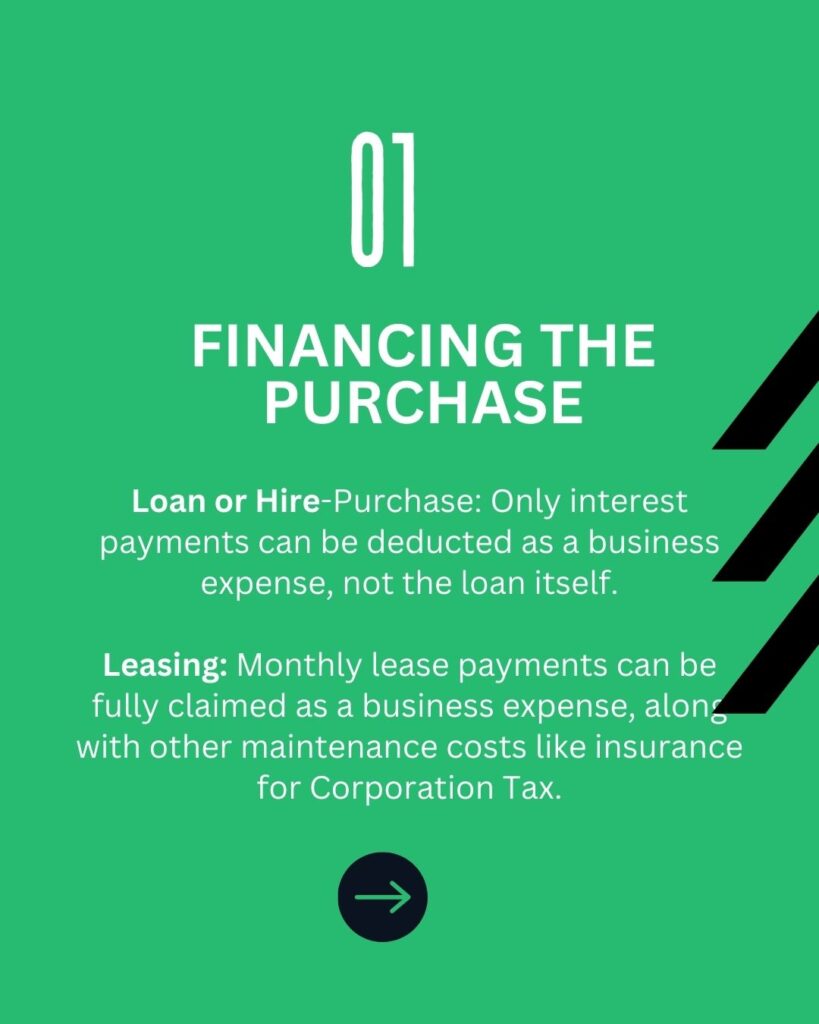
Will the vehicle be used for purely business purposes?
If your car is used solely for business-related purposes, you will be allowed to claim VAT back on the purchase.
If your company vehicle is used for personal purposes outside of the business, this is considered a Benefit-In-Kind (BIK). A benefit-in-kind is anything HMRC considers to be a benefit or a perk on top of your salary. Your business will be taxed on benefits-in-kind.
To reclaim the VAT on your company car you will need to be able to prove to HMRC that the vehicle is not and cannot be used by you or your employees for personal reasons. For example, do you have a company car that is always kept on stand-by at the dental practice for use by the business? That can be considered an exemption.
HMRC does not consider your normal commute to and from work to be a business use, so you will not be able to claim VAT on your vehicle if it is primarily used for commuting.
You can also claim back VAT on vehicles which are used as part of your employee’s routine duties. For instance, vehicles used for teaching people how to drive, taxis and vehicles which are primarily loaned in self-drive schemes.
Action Points
- Assess the vehicle’s usage to ensure it’s strictly for business purposes.
- Document and maintain proof that the vehicle is not used for personal reasons, to qualify for VAT reclaim.
- Be aware that personal use of the vehicle, including commuting, makes it subject to Benefit-In-Kind tax.
- Ensure the vehicle is designated for business-only activities, possibly keeping it on-site to reinforce this.
- Keep detailed records of the vehicle’s use in employee routine duties to support VAT claims on such usage.
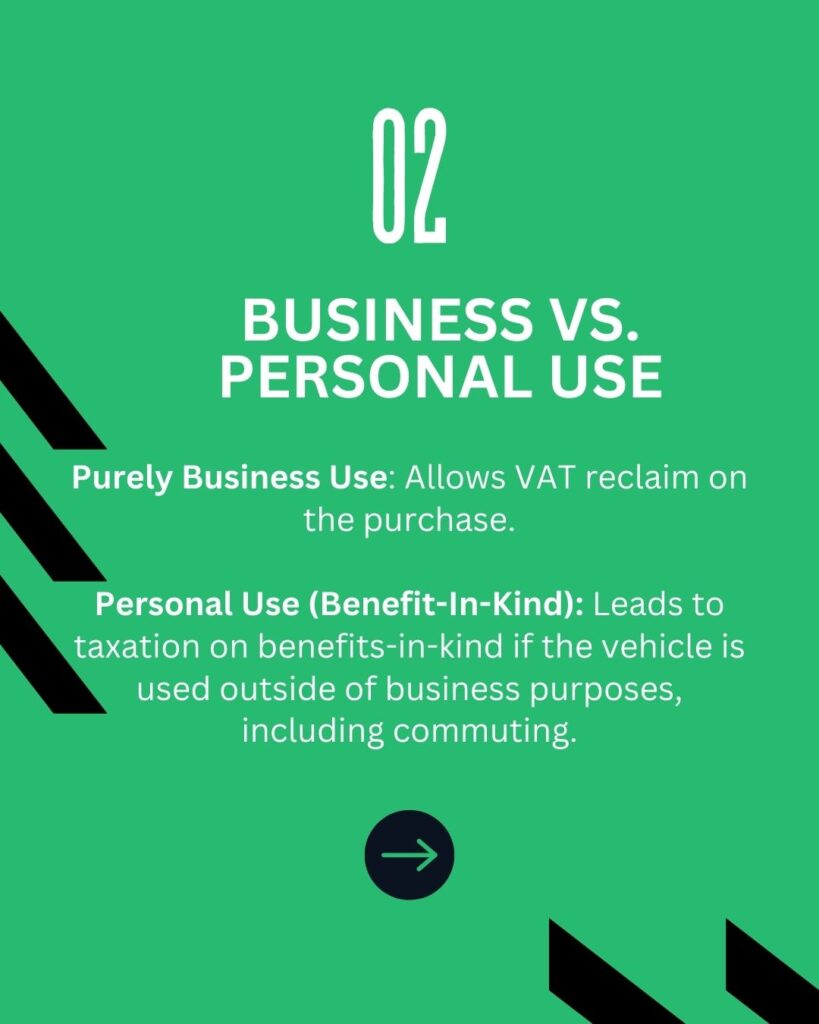
Is your company vehicle environmentally-friendly?
How much tax you pay on your company vehicle is also dependent on the CO2 emissions it produces and the date on which you bought it. This applies to both the tax rate of any benefits-in-kind and the capital allowances you can claim on the cost of buying the vehicle.
You can find out more about the difference between different emissions and dates of purchase, and how they affect the capital allowance rate you pay on the .gov.uk website.
For the most part, the more CO2 emissions produced by your company car, the more tax you will have to pay.
However, it is important to remember that the criteria also change according to how old your car is. The newer your car is, the greener it will need to be if you want to claim back on tax.
Action Point
- Evaluate the CO2 emissions of your company vehicle to understand the potential tax implications.
- Consider the vehicle’s purchase date, as newer cars require lower emissions to qualify for tax benefits.
- Explore First-Year Allowances for vehicles that meet eco-friendly standards to deduct 100% of the purchase cost.
- Determine if your vehicle qualifies for the Main Rate pool to claim 18% against taxable profits.
- Assess if your vehicle falls into the Special Rate band, allowing a 6% claim, aimed at discouraging the purchase of high-emission vehicles.
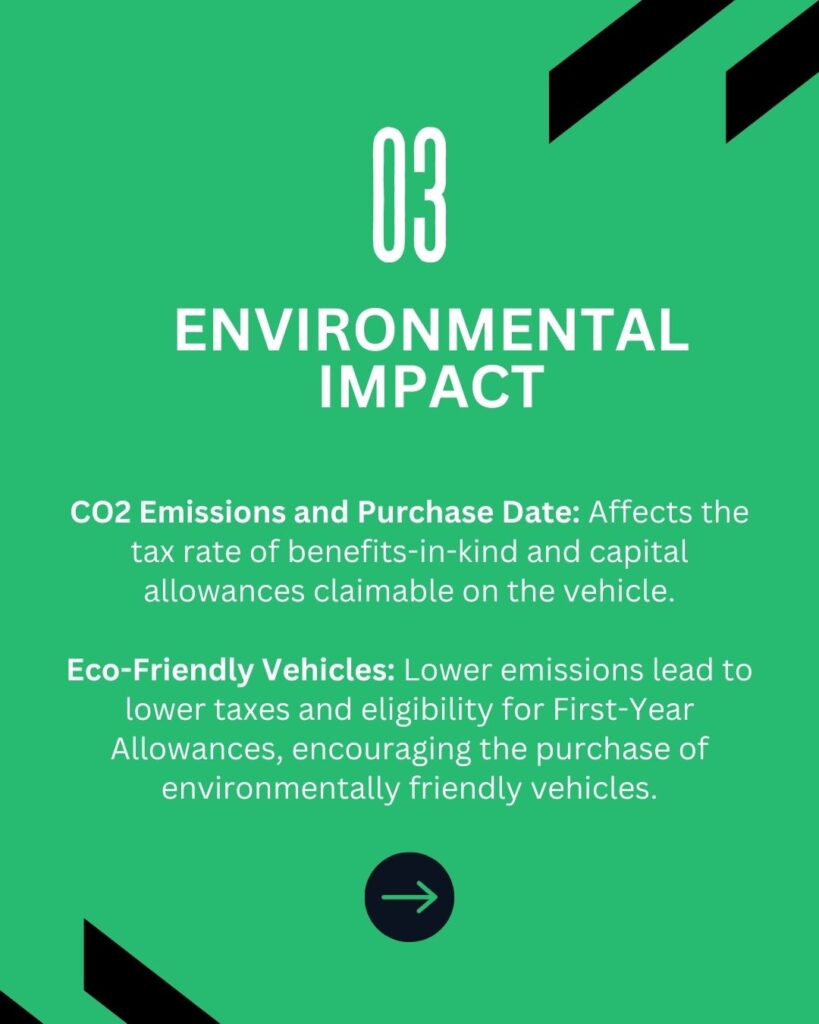
For instance, this is a table from the Government’s page on business cars:
Cars bought from April 2021
| Description of car | What you can claim |
| New and unused, CO2 emissions are 0g/km (or car is electric) | First year allowances |
| New and unused, CO2 emissions are between 1g/km and 50g/km | Main rate allowances |
| Second hand, CO2 emissions are between 1g/km and 50g/km (or car is electric) | Main rate allowances |
| New or second hand, CO2 emissions are above 50g/km | Special rate allowances |
Compare this with the rates for cars bought between April 2009 and April 2013:
Cars bought between April 2009 and April 2013
| Description of car | What you can claim |
| New and unused, CO2 emissions are 110g/km or less (or car is electric) | First year allowances |
| New and unused, CO2 emissions are between 110g/km and 160g/km | Main rate allowances |
| Second hand, CO2 emissions are 160g/km or less (or car is electric) | Main rate allowances |
| New or second hand, CO2 emissions above 160g/km | Special rate allowances |
Vehicles which meet the criteria for First-Year Allowances can have 100% of their cost of purchase deducted from the business’s taxable profits. This is intended to encourage British businesses to go green and purchase environmentally-friendly assets.
The Main Rate pool allows you to claim 18% of the cost of the purchase against your taxable profit.
The Special Rate band allows you to claim just 6% of the cost of the purchase. This is intended to discourage British businesses from buying environmentally-unfriendly assets.
You can calculate the tax band for your company car, according to its CO2 emissions, fuel consumption and date of purchase on the gov.uk website.
Contact us to find out more
How much tax do you need to pay on the fuel for your business car?
If your company owns a business car, you may be required to pay tax on the fuel required.
Again, how much tax you pay on the fuel will depend on the CO2 emissions and whether it is used for private or solely for business purposes.
If your business car is only used for business purposes then you will need to be able to prove this to HMRC. This is one of the reasons why it is so important to keep detailed records like submitted travel expenses and mileage reports. You can use these to show HMRC that all of the consumed fuel was used for business purposes, and not personal use.
If you cannot prove this, or you have indeed used the car (and thus the fuel) for personal reasons, this will be considered a benefit-in-kind. Therefore, you will need to pay tax on the benefit-in-kind fuel usage.
If you can show HMRC that the vehicle has not been used for anything other than company business, you will not need to pay any additional benefit-in-kind tax. You will also be able to reclaim the full VAT amount on the fuel.
You will also not have to pay VAT on the fuel usage if the vehicle is used in certain other circumstances. For instance, cars used for business journeys such as those that are part of the employee’s normal routines like a tradesperson travelling to appointments (this does not include your normal commute to work), or one of your associates travelling to a temporary place of work.
Action Points
- Assess the CO2 emissions and usage of the business car to determine fuel tax liability.
- Maintain detailed records, including travel expenses and mileage reports, to substantiate business-only use of fuel.
- Be prepared to provide HMRC with evidence that the fuel was exclusively used for business purposes to avoid benefit-in-kind tax.
- Reclaim full VAT on fuel for vehicles proven to be used solely for business activities.
- Understand the specific circumstances under which VAT on fuel usage is not applicable, such as business journeys excluding regular commutes.
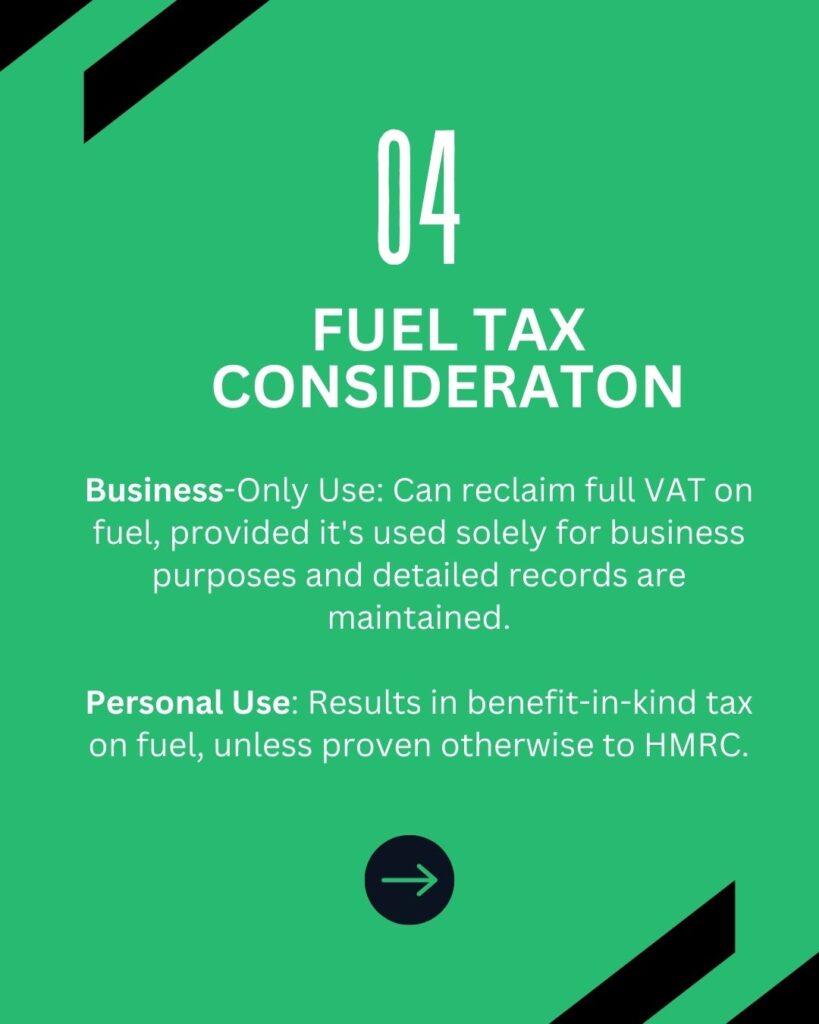
You can find out more about exemptions for tax payments on fuel on the gov.uk website.
Should you buy a business car via your dental practice?
So, are you better off purchasing a business car through your limited company or privately?
Let’s take a look at an example:
Harry is a dental practice owner who owns a limited company who wants to buy a business car at around £40,000.
Buying the car himself:
Harry can declare a £40,000 dividend from his limited company and use that to purchase a car. Harry has to pay 32.5% as a higher-rate taxpayer. This comes out to £13,000 in income tax he has to pay.
Buying the car via a limited company:
Harry could instead buy the care via his limited company. Since there is no dividend declared, there’s no added income tax. Harry’s capital allowances will also allow him to claim back £7,600 in corporation tax. In the current tax year, the benefits-in-kind tax rate is only 1%, meaning the tax on them will be minimal.
This means that Harry is better off to the tune of £20,600 by purchasing his business car through his limited company.
Action Points
- Evaluate the financial benefits of purchasing the car through your dental practice’s limited company versus personal purchase.
- Consider the tax implications of declaring a £40,000 dividend for personal purchase and the resulting 32.5% income tax.
- Explore the option of purchasing the car directly through the limited company to avoid dividend tax and capitalize on capital allowances.
- Calculate potential corporation tax savings and the minimal benefits-in-kind tax rate when purchasing through the company.
- Assess the overall financial advantage, in Harry’s case, a saving of £20,600, by opting for a company purchase.
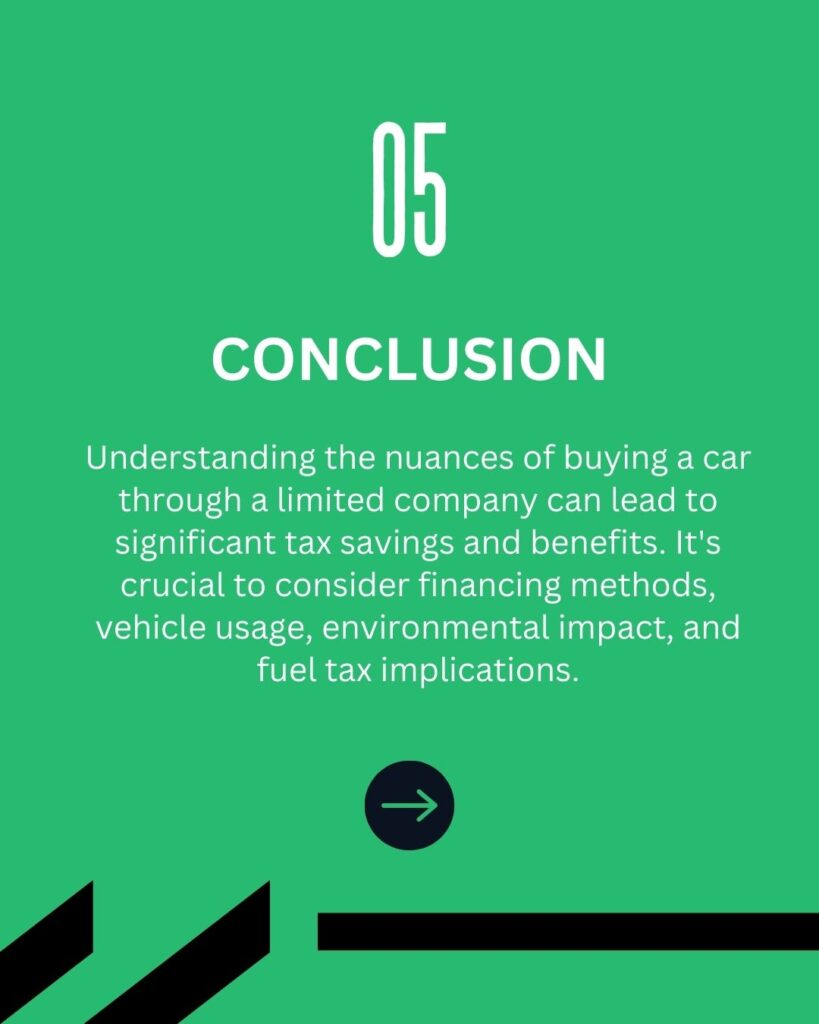
Our Expert Opinion
“Buying car through your business is a complex thing. So get the right advice specific to your business and car needs. Do this wrong and you could pay much more tax than needed!”

Buying a Car Through Your Limited Company FAQs
Can a limited company purchase a car?
Yes, a limited company can purchase a car, which can then be used for business purposes. The car becomes an asset of the company, and the company can benefit from tax deductions, such as capital allowances, for the vehicle. However, there are tax implications, particularly if the car is also used for personal purposes, which could trigger a Benefit-in-Kind (BIK) tax for the employee or director using the car.
What are the tax benefits of buying a car through a limited company?
Buying a car through a limited company offers several tax benefits. The company can claim capital allowances, which reduce taxable profits. If the car is used solely for business purposes, VAT on the purchase may be reclaimable. Additionally, running costs like insurance and maintenance can be deducted as business expenses however, if the car is also used personally, a Benefit-in-Kind (BIK) tax applies, which may offset some of these benefits.
How is company car tax calculated?
Company car tax is calculated based on the car’s value (known as the P11D value), its CO2 emissions, and your income tax rate. The P11D value includes the car’s list price, VAT, and any optional extras. A percentage rate is then applied based on the car’s CO2 emissions, which determines the taxable benefit amount. This benefit is added to your income, and you pay tax on it according to your tax bracket.
What is the Benefit-in-Kind (BIK) tax, and how does it apply?
Benefit-in-Kind (BIK) tax applies when a company car is available for personal use by an employee or director. It is calculated based on the car’s P11D value (list price, VAT, and extras) and its CO2 emissions. A percentage rate, determined by the emissions, is applied to this value to calculate the taxable benefit, which is then added to the employee’s income, and they pay tax on it according to their income tax rate.
Can I claim VAT on a company car purchase?
You can claim VAT on a company car purchase only if the car is used exclusively for business purposes, without any private use, including commuting. If there is any private use, you cannot reclaim the VAT on the purchase. However, you may still be able to claim VAT on some of the car’s running costs, depending on the level of business versus private use.
Are there any restrictions on using a company car for personal use?
Yes, there are restrictions on using a company car for personal use. If a company car is used for personal purposes, including commuting, it triggers a Benefit-in-Kind (BIK) tax for the user. This tax is calculated based on the car’s value and CO2 emissions, and the user must pay income tax on this benefit. The company must also report this usage to HMRC and may face additional tax liabilities.
What are the implications of leasing a car through a limited company?
Leasing a car through a limited company can offer tax advantages, such as deducting lease payments as a business expense and reclaiming VAT if the car is used exclusively for business. However, if the car is also used personally, a Benefit-in-Kind (BIK) tax will apply. Leasing might also avoid the large upfront costs associated with purchasing a car. Additionally, the lease may include maintenance, which can simplify budgeting for the company.
How does mileage reimbursement work for company cars?
Mileage reimbursement for company cars involves the company reimbursing employees for business-related travel at a set rate per mile. The reimbursement rate is determined by HMRC and is intended to cover fuel and other running costs. If the reimbursement is within the HMRC-approved rates, it is tax-free. If it exceeds the approved rate, the excess amount may be subject to tax as additional income.
Is it more tax-efficient to buy or lease a car through a company?
Whether it’s more tax-efficient to buy or lease a car through a company depends on factors like the car’s value, CO2 emissions, and how it’s used. Leasing can be more flexible with lower upfront costs and potentially more favorable tax treatment if the car is low-emission. However, buying may offer benefits like capital allowances. The best option varies based on specific business needs and tax implications, so it’s advisable to consult a tax professional.
How do electric vehicles impact company car tax?
Electric vehicles (EVs) can significantly reduce company car tax due to their lower CO2 emissions. They attract a lower Benefit-in-Kind (BIK) tax rate compared to traditional petrol or diesel vehicles. For example, fully electric cars can have a BIK rate as low as 2%, making them a tax-efficient option. Additionally, businesses can claim enhanced capital allowances for electric vehicles, further reducing taxable profits.
What expenses can be claimed for a company car?
For a company car, you can claim expenses such as fuel, maintenance, insurance, road tax, repairs, and depreciation through capital allowances. If the car is used for business purposes, these costs are deductible from the company’s taxable income. However, if the car is also used for personal purposes, the Benefit-in-Kind (BIK) tax may apply to the user.
Are there specific rules for high-emission vehicles?
Yes, there are specific rules for high-emission vehicles. These vehicles typically attract higher Benefit-in-Kind (BIK) tax rates due to their higher CO2 emissions. The percentage applied to the car’s P11D value increases with emissions, leading to a higher taxable benefit. Additionally, high-emission vehicles may have lower capital allowance rates, meaning less immediate tax relief for the company.
What is the difference between pool cars and company cars?
The main difference between pool cars and company cars lies in their usage. Pool cars are shared among employees, used strictly for business purposes, and kept at the company premises when not in use. Because they’re not available for personal use, they don’t attract Benefit-in-Kind (BIK) tax. Company cars, however, are assigned to specific employees and can be used for both business and personal use, which may trigger BIK tax for the user.
Can I sell a company car and what are the tax implications?
Yes, you can sell a company car, but there are tax implications. When you sell the car, any profit or loss compared to its book value will affect your company’s taxable income. If you sell the car for more than its written-down value, you may need to pay Corporation Tax on the gain. Conversely, if you sell it for less, you might be able to claim a tax relief.
How does capital allowance work for company cars?
Capital allowances allow a company to deduct the cost of a car over time from its taxable profits. The rate and amount you can claim depend on the car’s CO2 emissions. Lower-emission vehicles generally qualify for higher allowances, such as the first-year allowance, while higher-emission cars may only qualify for the writing-down allowance at a lower rate. This helps reduce the company’s taxable income gradually as the car depreciates.
Can I claim insurance costs for a company car?
Yes, you can claim insurance costs for a company car as a business expense. These costs are deductible from the company’s taxable income, helping to reduce the overall tax liability. The insurance must be for a vehicle used for business purposes, and if the car is also used for personal purposes, it may be subject to Benefit-in-Kind (BIK) tax.
What records should be kept for company cars?
For company cars, you should keep records of:
- Purchase details, including invoices and financing documents.
- Running costs like fuel, maintenance, insurance, and repairs.
- Mileage logs distinguishing between business and personal use.
- VAT records if applicable.
- Records of any Benefit-in-Kind (BIK) tax calculations.
- Details of any capital allowances claimed.
- Documentation of the car’s sale, including sale price and proceeds
How does employee salary sacrifice affect company car tax?
Employee salary sacrifice affects company car tax by reducing the employee’s gross salary in exchange for a non-cash benefit, such as a company car. The employee’s taxable income is reduced, potentially lowering their income tax and National Insurance contributions. However, the Benefit-in-Kind (BIK) tax for the company car still applies, based on the car’s value and CO2 emissions. The salary sacrifice scheme can be tax-efficient, especially with low-emission vehicles.
Can a director use a company car?
Yes, a director can use a company car. However, if the car is available for personal use, it will trigger a Benefit-in-Kind (BIK) tax, which the director must pay based on the car’s value and CO2 emissions. The company can claim related expenses, such as insurance and maintenance, as business deductions, but personal use must be accounted for in the tax calculations.
What are the penalties for incorrect company car tax reporting?
Incorrect company car tax reporting can result in penalties from HMRC, including fines and interest on any unpaid taxes. If errors are found to be deliberate, penalties can be severe, potentially up to 100% of the underpaid tax. Even accidental mistakes can lead to fines, so it’s crucial to keep accurate records and ensure all tax liabilities are correctly reported.
About the Author

Arun Mehra
With almost twenty years of commercial experience and knowledge in Dentistry, Arun’s expertise is valued by hundreds of businesses across the UK. His financial acumen and know-how, along with his hands-on commercial expertise have helped clients, large and small, new and established to achieve great things.
Arun is the founder of the Samera Group, starting the business with just one client sitting at his father’s dining table. Fifteen years on, Team Samera now service hundreds of Dental clients, run exciting events, help clients raise finance, and are very active in helping clients buy or sell Dental practices.
Further Information on Accounts & Tax
Our team of specialist accountants and tax experts can help manage, process and structure your business’s finances. From management accounts and payroll & pensions to tax planning and cash flow management, we can take care of the full back-office function of your business.
Book a free, no-obligation consultation with one of the team to find out how we can make your accounts & tax easier, quicker and cheaper.
Make sure you never miss any of our articles, webinars, videos or events by following us on Facebook, LinkedIn, YouTube and Instagram.



